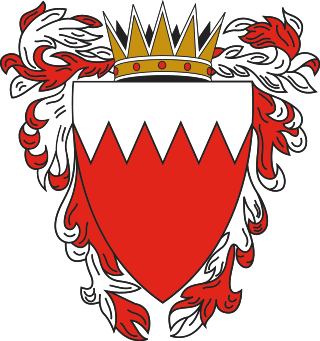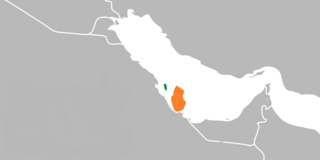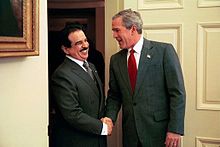
Bahrain plays a modest, moderating role in regional politics and adheres to the views of the Arab League on Middle East peace and Palestinian rights. Since achieving independence in 1971, Bahrain has maintained friendly relations with most of its neighbours and with the world community. It generally pursues a policy of close consultation with neighbouring states and works to narrow areas of disagreement.

Foreign relations of Israel refers to diplomatic and trade relations between Israel and other countries around the world. Israel has diplomatic ties with 164 of the other 192 UN member states as of December 2020. Israel is a member of the United Nations (UN) and a number of other international organisations. Israel maintains full diplomatic relations with two of its Arab neighbours, Egypt and Jordan, after signing peace treaties in 1979 and 1994 respectively. In 2020, Israel signed agreements establishing diplomatic relations with three Arab League countries, Bahrain, the United Arab Emirates, and Morocco. As of 2021, Israel had formal diplomatic relations with 168 other countries, while twenty-eight UN member states have either never established, or have broken off diplomatic relations with Israel.

Hamad bin Isa bin Salman Al Khalifa is King of Bahrain since 14 February 2002, after ruling as Emir of Bahrain from 6 March 1999. He is the son of Isa bin Salman Al Khalifa, the previous and first emir. The country has been ruled by the Al Khalifa dynasty since 1783.

Al-Wefaq National Islamic Society, sometimes shortened to simply Al-Wefaq, was a Shi'a Bahraini political party, that operates clandestinely after being ordered by the highest court in Bahrain to be dissolved and liquidated. Although from 2006 to 2011 it was by far the single largest party in the Bahraini legislature, with 18 representatives in the 40-member Bahraini parliament, it was often outvoted by coalition blocs of opposition Sunni parties and independent MPs reflecting gerrymandering of electoral districts. On 27 February 2011, the 18 Al-Wefaq members of parliament submitted letters of resignation to protest regime violence against pro-reform Bahraini protestors.

Khalid bin Ahmed Al Khalifa is a Bahraini diplomat who served as Bahrain's Minister of Foreign Affairs from 2005 until January 2020. Khalid became only the second foreign minister in Bahrain's history after replacing Mohammed bin Mubarak Al Khalifa who then became Bahrain's deputy prime minister.

The dynamic between the League of Arab States and the Islamic Republic of Iran has been ambivalent, owing to the latter's varying bilateral conduct with each country of the former. Iran is located on the easternmost frontier of the Arab League, which consists of 22 Arab countries and spans the bulk of the Middle East and North Africa, of which Iran is also a part. The Arab League's population is dominated by ethnic Arabs, whereas Iran's population is dominated by ethnic Persians; and while both sides have Islam as a common religion, their sects differ, with Sunnis constituting the majority in the Arab League and Shias constituting the majority in Iran. Since Iran's Islamic Revolution in 1979, the country's Shia theocracy has attempted to assert itself as the legitimate religious and political leadership of all Muslims, contesting a status that has generally been understood as belonging to Sunni-majority Saudi Arabia, where the cities of Mecca and Medina are located. This animosity, manifested in the Iran–Saudi Arabia proxy conflict, has greatly exacerbated the Shia–Sunni divide throughout the Muslim world.

Relations have existed between Bahrain and Israel since Bahrain achieved its independence in 1971. In recent years, relations between the two countries have been thawing, and the countries agreed to establish diplomatic relations in September 2020. The foreign minister of Bahrain Khalid bin Ahmed Al Khalifa has been quoted saying "Israel is part of the heritage of this whole region, historically. So, the Jewish people have a place amongst us." The common threat of Iran has provided common ground for a thaw in what were once tense relations. Bahrain's foreign policy traditionally supports the creation of an independent Palestinian state.

Relations exist between the United Arab Emirates and Bahrain. Relations between the two countries are close and friendly, with the U.A.E. having an embassy in Manama while Bahrain maintains its embassy in Abu Dhabi. Both states are geographically a part of the Persian Gulf and lie in close proximity to one another; both are also members of the Gulf Cooperation Council (GCC).

Political relations between the State of Palestine and the United States have been complex and strained since the 1960s. While the U.S. does not recognize the State of Palestine, it recognizes the Palestine Liberation Organization (PLO) as the legitimate representative entity for the Palestinian people; following the Oslo Accords, it recognized the Palestinian National Authority as the legitimate Palestinian government of the Palestinian territories.

The 2011Bahraini uprising was a series of anti-government protests in Bahrain led by the Shia-dominant and some Sunni minority Bahraini opposition from 2011 until 2014. The protests were inspired by the unrest of the 2011 Arab Spring and protests in Tunisia and Egypt and escalated to daily clashes after the Bahraini government repressed the revolt with the support of the Gulf Cooperation Council and Peninsula Shield Force. The Bahraini protests were a series of demonstrations, amounting to a sustained campaign of non-violent civil disobedience and some violent resistance in the Persian Gulf country of Bahrain. As part of the revolutionary wave of protests in the Middle East and North Africa following the self-immolation of Mohamed Bouazizi in Tunisia, the Bahraini protests were initially aimed at achieving greater political freedom and equality for the 70% Shia population.

Abdullatif bin Rashid Al Zayani is a Bahraini engineer and retired lieutenant general. He is the foreign minister, having formerly been the secretary general of the Gulf Cooperation Council (GCC) from 1 April 2011 to February 2020. He was the fifth GCC secretary general and the first with military background since the GCC was established.

Bilateral relations exist between the State of Qatar and the Kingdom of Bahrain. They first began in 1971.

Tomasz "Tom" P. Malinowski is an American politician and diplomat who was the U.S. representative from New Jersey's 7th congressional district from 2019 to 2023. A Democrat, he served as Assistant Secretary of State for Democracy, Human Rights, and Labor in the Obama administration.

Bilateral relations exist between the countries of Bahrain and Iran. Since the 1979 Iranian Revolution, relations between the two countries have been strained over various geopolitical issues such as the interpretations of Islam, Awakening of the Islamic world, and relations with the United States, Europe, and other Western countries. In addition, Iran has been severely critical of Bahrain for hosting the United States Fifth Fleet within the Persian Gulf at the Naval Support Activity Bahrain base.

Historic and current bilateral relationship exist between Bahrain and Japan. Diplomatic relations were first established in 1972, and since then they have had increasing economic, cultural, and military cooperation, with Japan becoming one of the major trading partners of Bahrain. Several high-level official visits have taken place, including by King Hamad bin Isa Al Khalifa to Japan in 2012, Crown Prince Salman in 2013, and Prime Minister Shinzo Abe to Bahrain in 2013, with the governments of both countries expressing their intent to continue to increase their bilateral relations.
The Arab–Israeli alliance, sometimes called the Israeli–Sunni alliance, refers to an unofficial security coalition comprising Israel and various Arab countries. Originally formed in the interest of the Gulf Cooperation Council, it is primarily focused on deterring the political and military ambitions of Iran, and has been actively promoted by the United States since the February 2019 Warsaw conference.

The Abraham Accords are bilateral agreements on Arab–Israeli normalization signed between Israel and the United Arab Emirates and between Israel and Bahrain on September 15, 2020. Mediated by the United States, the announcement of August 13, 2020, concerned Israel and the UAE before the subsequent announcement of an agreement between Israel and Bahrain on September 11, 2020. On September 15, 2020, the signing of the agreements was hosted by US president Trump on the Truman Balcony of the White House amid elaborate staging intended to evoke the signings of historic formal peace treaties in prior administrations.

The Bahrain–Israel normalization agreement, officially Abraham Accords: Declaration of Peace, Cooperation, and Constructive Diplomatic and Friendly Relations, is an agreement to normalize diplomatic and other relations between Bahrain and Israel. The agreement was announced by President Donald Trump on September 11, 2020, and followed on from a joint statement, officially referred to as the Abraham Accords, by the United States, Israel and the United Arab Emirates (UAE) on August 13, 2020. It was formally signed on September 15, 2020, at the White House in Washington, D.C., and made Bahrain the fourth Arab state to recognize Israel and the second within a month.
The Israel–Sudan normalization agreement is an agreement that took place on October 23, 2020, whereby Israel and Sudan agreed that they will normalize relations. It is not clear if the deal establishes full diplomatic relations between the two nations. According to Axios reporting on March 10, 2021, "While Israel has presented Sudan with a draft agreement for establishing diplomatic relations, the Sudanese want an endorsement from the Biden administration." The agreement came after the agreements of Bahrain and the United Arab Emirates signed with Israel in September 2020. Unlike the latter two, Sudan had sent troops to fight against Israel in major Arab-Israeli wars and considered Israel an enemy state.

Bahrain-Germany relations have existed since 1972 and are described as "good" by the German Foreign Office. Germany enjoys a good reputation in the country of Bahrain, and the German economy in particular is highly regarded.





















